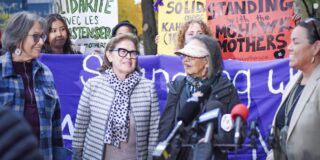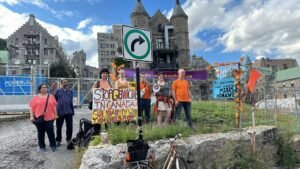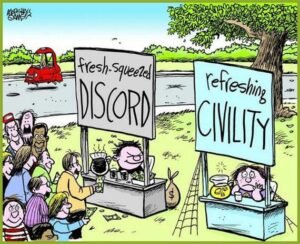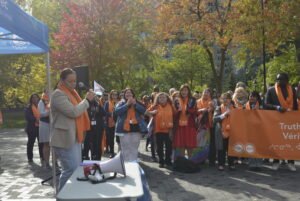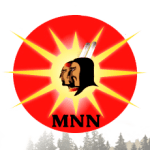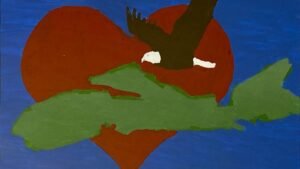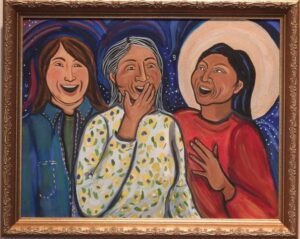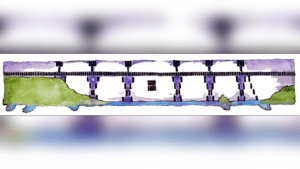
PRESS RELEASE
Please post & circulate immediately.

MNN. Sep. 15/23. September 14, 2023. Quebec Superior Court, District of Montreal. Oral submissions by Kahnistensera vs SQI, McGill et al. Judge will make a decision next Monday: REGARDING 20 T0 70 FALSE POSITIVES FLAGGED BY THREE DOGS & GPR [ground penetrating radar]. Mohawk Mothers. face ‘denialism’, ‘disbanding’ of Expert Panel, and other questionable actions.
Kwetiio, Bear. Clan: “A grave matter brings me here which. is about to get disastrous. The last time we were here was to discuss the findings, by Historic Human Remains Detection Dogs (HHRDD), of the scent of decaying human remains in front of the wall of the Hersey Pavilion, the Nurses’ Residence of the Royal Victoria Hospital. Since then, in several public releases – and again in Pierre Major’s affidavit filed yesterday – McGill University quotes a study underscoring between 20 and 70 percent of false positives for HHRDD. What McGill doesn’t mention is that this number is exponentially reduced when other dogs alert. At the Hersey pavilion, three dogs flagged. McGill’s communications also didn’t mention was a 12-year-old study, which specifies that dogs become more efficient with further training – and HHRDD have gotten much better since 12 years. They don’t mention either that the study’s sample was only three dog teams, that it was only based on teeth, and that it defined false positives,: “based on alert distance from target, it is important to recognize that these false positives do not necessarily translate to the equivalent of a dog alerting in a blank area”.. They don’t mention either that the dogs in this study were not HHRDD but HRD, which smell recent human remains instead of historic, older ones, and which have an entirely different training. Another study, this one from 2021, that was cited by the Panel of archaeologists but not by McGill, states that “the probability that two dogs would have a false positive at the same box is less than 0.06%”. This is from “Applying Canine Detection in Support of Collaborative Archaeology”, by Grebenkemper et al.
 We sent the full exhibit this morning and we brought copies of the relevant pages for all parties. Right in front of the wall of the Hersey Pavilion of the Royal Vic, not two but three dogs alerted. Calling this an absence of evidence is outright denialism and rejection of science. Last time we were here, Mister Justice, the Defendants denied that there was any evidence of remains. Now they are stating the same notion publicly, that no evidence has been found, that the investigation is over. They don’t mention the woman’s dress – that was handled without any forensic care when it was taken out of the ground and that was admittedly almost put in the garbage. They don’t mention the old children’s shoes, all the allegedly “animal” bones, the ball of hair or the very concerning so-called slag, this purple/maroonish substance poured all over a layer of soil, which was apparently used to “sanitize” it, and as we recently learned, perhaps also to decompose organic matter. That we don’t quite know, because the Defendants and their contractors did not deem advisable to study it further.
We sent the full exhibit this morning and we brought copies of the relevant pages for all parties. Right in front of the wall of the Hersey Pavilion of the Royal Vic, not two but three dogs alerted. Calling this an absence of evidence is outright denialism and rejection of science. Last time we were here, Mister Justice, the Defendants denied that there was any evidence of remains. Now they are stating the same notion publicly, that no evidence has been found, that the investigation is over. They don’t mention the woman’s dress – that was handled without any forensic care when it was taken out of the ground and that was admittedly almost put in the garbage. They don’t mention the old children’s shoes, all the allegedly “animal” bones, the ball of hair or the very concerning so-called slag, this purple/maroonish substance poured all over a layer of soil, which was apparently used to “sanitize” it, and as we recently learned, perhaps also to decompose organic matter. That we don’t quite know, because the Defendants and their contractors did not deem advisable to study it further.
We were told that HHRDD dogs can detect human DNA even after bodies are decomposed. This has to be looked into. But it wasn’t done, in the absence of the Panel to recommend it. For the same reason we were not able to investigate the horrid fetid smell coming from a layer of soil, that slowly dissipated when it dried in a pile under the sun, nor the smell that came from the pipe protruding out of the Hersey building, exactly where the three dogs alerted.
Denialism is what we are facing. It is sad, sorry, and for us, retraumatizing. Constant gaslighting. The Panel and dog handlers all suggested searching a 10 meter radius around the spot. Ethnoscop asked about entering the building. The SQI refused. End of the story! They claim the investigation is over, there are no remains! In addition to the 9 potential graves detected, of which we ended up having a (rather botched) report yesterday – not as a report shared with us, but as an exhibit shared by Mrs. Mayes from SQI after the 4pm deadline.
The GPR survey by GeoScan detected a great number of unknown anomalies in the Priority Zone which have never received any attention, even though GeoScan’s report deemed that they could be graves of children or graves without coffins, like our ancestors did. Those anomalies have been entirely pushed to the wayside by the Defendants, and silenced in all their communications. A cluster of potential graves and unknown anomalies is situated immediately next to where the Defendants started heavy excavation work on Tuesday, in defiance of the upcoming court hearing. on Sep. 14/23. Mrs. Mayes’ affidavit also includes another piece of information which we were never made aware of, even though we were the very instigators of this whole process. In Exhibit SMC-15, Mr Whiting, from GeoScan, responds to the SQI complaining that their report suggested the numerous unknown anomalies could be unmarked graves, by saying: “What I usually recommend in these cases is to absolutely approach the “potential” graves as if they are in fact graves, and investigate with full archaeological protocols. In the case of the “unknown” features, these are normally approached with a sampling strategy. In particular I usually suggest archaeological excavation/testing of the closest Unknown features to the features we ID as “potential”, say within a 10 m radius of each potential. If any of the unknowns turn out in fact to be burials, then expand the radius another 5 m and continue testing unknowns until all are negative. There may also be some unknowns or clusters of unknowns some distance away from any potentials that should be tested. Especially if they look rectangular in map view”.

Mr Whiting of GeoScan then suggests drafting a sampling strategy. The SQI do not respond to this professional advice, nor will it ever, as it is now to be assumed, because SQI executives are not experts in searching for unmarked graves, and are not qualified to manage this investigation. In fact all their actions indicate they do not wish it ever happened at all. They refused to share the data with the Panel who asked and who. were jointly selected with them through painstaking negotiations. The settlement agreement specifies that all parties must be guided by the Panel’s recommendations as to who should analyze the data. A clear breach of the agreement. They refused to share it with the Canadian Archaeological Association’s Working Group on Unmarked Graves, the top experts in Canada, for a peer review, as asked for by the Panel too. This is McGill, a world class institution and the SQI, a public body from the Quebec government, doing this. Refusing expertise. Disbanding the Panel, to simply take over the whole process.
It is unexplainable that any credible investigation would operate without project managers who know what they are doing and have expertise. Agreeing on three experts to provide recommendations was the bottom line of the agreement. To stop arguing, and let the experts decide what is the best to way to find, protect and respect human burials on the site of this hospital. This is where some of worst medical experiments in human history took place. We repeat again it: we are here to find our children, to find the truth of what happened, and who is accountable.
Cherry picking which of the Panel’s recommendations they would implement came to define the defendants’ methodology. The Panel asked to carefully excavate GPR targets and sift the soil? The Defendants rather used mechanical excavators rushing through 8 holes in a single day and immediately refilled them back, unsifted. The Panel asked to use S4 Probes in the Soil. It wasn’t done. On July 25th we were literally attacked by the SQI’s security, who grabbed our camera to erase images of their racially charged insults of Indigenous elders on the site. McGill and SQI gave us their best assurances that they would not be there anymore. Last Sunday, who do we see on the site where GPR was being done? The same security guards! After the assault we couldn’t return there for three weeks and the piles of soil excavated around the dog’s target were just left to the rain, unattended. The Panel wrote to say they should be covered.
That’s the value of having a Panel overview an investigation. The Panel also said at that time that it would be necessary to involve a forensic specialist with the Panel to protect the chain of custody of evidence. The Defendants simply dismissed their recommendation, refusing to treat the search for unmarked graves in any credible and professional way. Many other Panel recommendations that were rejected by the Defendants emphasized that it was necessary for the Panel to follow up on the implementation of the recommendations, to adapt to the reality of what is happening on the ground. The Panel reported that it needs “to be informed of the outcome of any related work – Archival research, HHRDD investigations, GPR survey, S4 probe and monitoring. The Panel will review these reports and provide updated recommendations (if warranted) within 1 month of receipt of each report”. A Panel member explained that it was a professional and ethical obligation to follow up on their recommendations.
 SQI and McGill decided to manage everything themselves, through contracts and non-disclosure agreements, to be judge and jury, and to manage and argue that somehow it’s a good thing that experts are not involved and have no say. McGill University submits that the agreement has not been breached, that only monitoring was required in the zone where they excavated last Tuesday, and that there is nothing to see. “Just trust McGill”, they said in this Court last October. The Defendants do not dispute, apparently, that the spirit of the agreement was breached many times by them as well as their letters. McGill and SQI suggest that the agreement limited the mandate of the Panel to selecting archaeological techniques, and that they had no say in how they would be applied. Mcgill and SQI would entirely take over the investigation. We strongly disagree with such a distorted interpretation of the agreement. However, the Defendants state that the only way the Panel could come back would be under Section 17 of the agreement, which provides that “if following the execution of the Techniques, there are no graves identified in a given area, the excavation work can begin on a rolling basis, in a sensitive manner with appropriate monitoring that will allow a prompt reaction in the event there is some unexpected discovery, at which point McGill, SQI and the Kanien’keha:ka Kahnistensera will seek the advice of the Panel as to how to move forward.”
SQI and McGill decided to manage everything themselves, through contracts and non-disclosure agreements, to be judge and jury, and to manage and argue that somehow it’s a good thing that experts are not involved and have no say. McGill University submits that the agreement has not been breached, that only monitoring was required in the zone where they excavated last Tuesday, and that there is nothing to see. “Just trust McGill”, they said in this Court last October. The Defendants do not dispute, apparently, that the spirit of the agreement was breached many times by them as well as their letters. McGill and SQI suggest that the agreement limited the mandate of the Panel to selecting archaeological techniques, and that they had no say in how they would be applied. Mcgill and SQI would entirely take over the investigation. We strongly disagree with such a distorted interpretation of the agreement. However, the Defendants state that the only way the Panel could come back would be under Section 17 of the agreement, which provides that “if following the execution of the Techniques, there are no graves identified in a given area, the excavation work can begin on a rolling basis, in a sensitive manner with appropriate monitoring that will allow a prompt reaction in the event there is some unexpected discovery, at which point McGill, SQI and the Kanien’keha:ka Kahnistensera will seek the advice of the Panel as to how to move forward.”
The last time we were in this Court after the dog’s finding, McGill and SQI argued that since this was an unexpected discovery Section 17 would apply, and they deferred to the panel asking to excavate a 10 meter radius around the target. A 10 meter radius from which the Defendants somehow managed to exclude inside the building, even though the target is just next to the wall. Now they entirely changed their interpretation, and they say that Section 17 does not apply and that there is no use bringing in the Panel. We could think that they’d rather rely on the expertise of the service providers, like GPR technicians, but that’s not even the case since they dismissed GeoScan’s recommendation to investigate unknown anomalies that are the closest to potential grave anomalies.
The Defendants now suggest that the only “unexpected discovery” that could bring back any sort of expert in the picture would be after a body is found, after a backhoe or an excavator hits human bones. Yet the SQI admitted, in an email by Sophie Mayes shared on August 1st (Exhibit MM-8), that there is no way that the Panel could be involved if a body was found: “If Ethnoscop’s professionals identify human bones on site, the latter will be legally obligated to immediately inform the Ministère de la Culture et des Communications and the Montreal Police Department (including the Coroner). Consequently, in the event of such discovery, neither Ethnoscop, the SQI, the Panel, McGill nor the Kahnistensera will have control over the following steps.” Therefore, the SQI ruled out the possibility that the “unexpected discovery” bringing back the Panel as per Section 17 of the agreement applies to human burials. The only other possible interpretation of Paragraph 17 is that an “unexpected discovery” actually means something three HHRDD alerting on human remains, or Ground Penetrating Radar yielding concerning unanalyzed data like what was unexpectedly found in the zone immediately adjacent to where the Defendants have started excavating Tuesday.
Article 13 has also explicitly been breached. It provides that “SQI, McGill, and the Kanien’keha:ka Kahnistensera agree to be (…) guided by the recommendations of the Panel as to the specialists to carry out the techniques and analyze the relevant data”. The Panel recommended the Canadian Archaeological Association CAA and themselves to analyze the data. The Defendants have simply refused. Article 1 states “that archival and testimonial work will begin immediately and the results of such work will be communicated to the Panel (defined below) on an ongoing basis to inform their work.” Given the termination of the Panel’s mandate, they won’t have time to do this, so the Defendants have breached this article. As they breached articles 2, 3 and 4, where McGill, the McGill University Health Center and the Attorney General of Canada promise expedited access to their archives, “including restricted files.”
 Canada is still slowly processing an ATIP request we made more than a year ago, while McGill’s most important files on their psychiatrists’ potential involvement with Indigenous people need approval from the Canadian Army- still now, 70 years from the fact. The McGill University Health Center has provided no record at all, not even finding aids. As Kahentinetha will explain later, article 9, that allow us to appoint Cultural Monitors to oversee the respect of Onkwehonweh protocol on site, has been breached by threats to our security. And finally, by disbanding the Panel, the Defendants breached Article 11, which states that the “The mandate of the Panel is to assess and identify the appropriate archeological techniques to be used on different areas of the site to detect whether there are unmarked graves.”If its mandate is terminated, it is impossible for the Panel to assess and identify the appropriate archaeological techniques, except if we define “to identify techniques” as simply selecting them.
Canada is still slowly processing an ATIP request we made more than a year ago, while McGill’s most important files on their psychiatrists’ potential involvement with Indigenous people need approval from the Canadian Army- still now, 70 years from the fact. The McGill University Health Center has provided no record at all, not even finding aids. As Kahentinetha will explain later, article 9, that allow us to appoint Cultural Monitors to oversee the respect of Onkwehonweh protocol on site, has been breached by threats to our security. And finally, by disbanding the Panel, the Defendants breached Article 11, which states that the “The mandate of the Panel is to assess and identify the appropriate archeological techniques to be used on different areas of the site to detect whether there are unmarked graves.”If its mandate is terminated, it is impossible for the Panel to assess and identify the appropriate archaeological techniques, except if we define “to identify techniques” as simply selecting them.
This is what we call a sharp dealing, breaching the spirit of reconciliation. We submit that these breaches to the agreement are prejudicial to all searches for unmarked graves throughout Turtle Island. It will affect all indigenous people for generations to come in setting precedents that will have implications for the overall relationships between us. We have a protocol called the One Dish and One Spoon. It unites all Indigenous peoples and played a huge role in the Great Peace of Montreal in 1701. The story is in the Kaianerehkowa, the Great Path that we follow as the Rotinonshonni confederacy. The Peacemaker Dekanawida showed a big dish, saying that all people share it. It’s our shared territory, our mother, that provides our subsistence. Dekanawida said that when sharing the great dish with one spoon, nobody should use sharp objects, so as to not hurt each other.
Canada has admitted genocide. At the National Gathering on Unmarked Burial in Montreal last week, the Attorney General of Canada said that “we cannot deny and we should not deny what happened in residential schools or their effect on many generations”. Our relationship has to change. Everyone wants it to change. We asked this Honorable Court to help the Defendants, all the institutions that verbally commit to reconciliation, to make that step in the 21st century to truly change the way we live alongside one another. Our duty as Kahnistensera (life-givers) is to caretake the land and the children of past, present and future generations. We are following our own law, the Kaianerehkowa. It is the way we have conducted ourselves since time immemorial to keep peace on this land and to help creation continue and grow. This place, Tiotiake, is our land, where our culture originated. Tekanontak (Mount Royal) and what is now the campus of McGill University contains the remains of one our biggest villages in all the land of the flint, Kanienkeh, our territory. Our people and children were murdered in order to get the land, to cut the connection between us, Kahnistensera, and the land. It is the greatest power: the power of the relationship between a mother and her children. We have the right to accomplish our traditional duties as Kahnistensera. It is not only the appearance of a right, it is our responsibility. The irreparable harm is not only certain to happen in the short term, it was already partially started when the Defendants started excavating, even refusing to wait until the court date. Once they disrupt those pipes which are, as McGill and SQI admitted, PERFECTLY FUNCTIONAL AT THIS TIME, they will necessarily have to excavate the whole Priority Zone area, including where the dogs detected remains. We hope that the damage already done is not too great, but it is certainly not something that anything else than a halt to the work and a reassessment of the situation can buy.
Nothing can compensate the loss of the trust of our people, of all Onkwehonwe, in the responsibility of McGill, Quebec and Canada to protect the basis of our human rights. To halt excavation until the origin of the scent of human remains is found, and until the GPR findings are studied in a serious way is the only honorable thing to do. For these reasons, I ask the court to grant the declaratory relief and safeguard order which will allow us to search for our children in a peaceful, professional, fruitful and therefore timely manner. NIAWEN:KOWA O:NEN
The late Willie Dunn put together words, ideas and laments to remind us to keep going: O Canada:
Our home and native land
One hundred thousand years
We’ve walked upon your sands
With saddened hearts
We’ve seen you robbed and stripped
Of everything you prized
While they cut down the trees
We were shunted aside
To the jails and the penitentiaries
O Canada
Once glorious and free
O Canada
We sympathize with thee
O Canada
MOHAWKNATIONNEWS.COM
thahoketoteh@ntk.com MNN court correspondent
box 991, kahnawake que. canada J0L 1B0 kahentinetha2@protonmail.com




